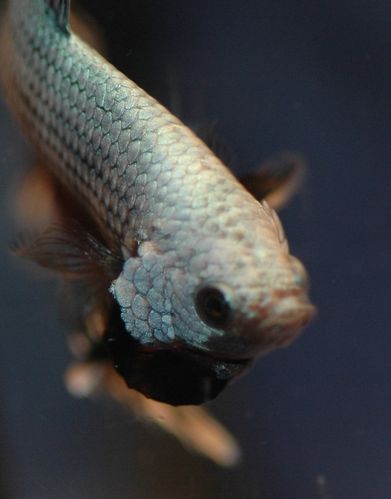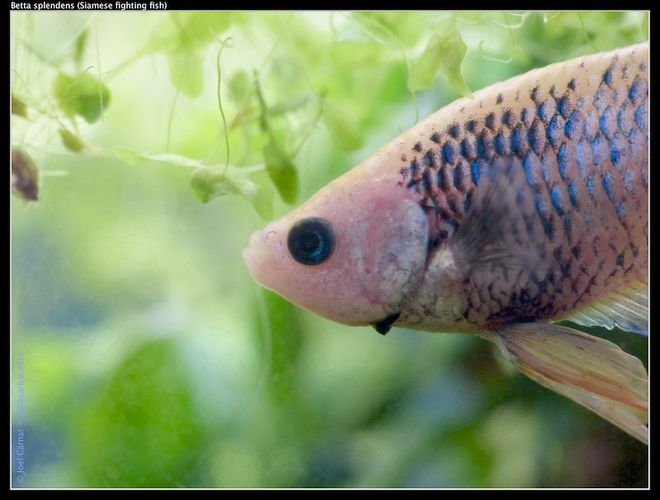Have you noticed that your betta’s scales are beginning to shed? You’re probably wondering if this is normal, or if it’s something that you should worry about.
That leads us to the question, do betta fish shed? Keep reading to find out.
Do Betta Fish Shed?

The bottom line is that betta fish do not shed or molt naturally.
Molting or shedding is the process in which an animal will shed their outer layer. Molting usually refers to the shedding of the outer layer of their skin or exoskeleton. Shedding also often refers to the loss of fur in mammals.
Molting or shedding occurs with the changing seasons, or as the animal grows. It allows their bodies to adapt to changes.
For example, molting is very common in crabs and other crustaceans. If you’ve ever kept an aquarium with a crab, you would have noticed it molting. If it was a hermit crab, you would’ve had to provide larger shells for the growing crab to grow into.
Molting is a natural process for many different animals. Still, it’s not normal for bettas.
So, if you’ve noticed that your betta is shedding their scales or fins, it means there’s something wrong. You’ll want to get to the bottom of this problem so that your fish can get better.
Why Is My Betta Fish Losing Their Scales?

Shedding their fins and scales is not normal for bettas or any fish species. They have no need to shed or molt because their bodies grow and stretch as they age.
If you notice your betta shedding, it’s likely because they’re sick. Or, there may be something wrong with their environment.
To prevent more harm to your fish, you’ll want to get to the bottom of this shedding problem. You’ll need to observe your betta for any changes in behavior.
A sick betta is likely to exhibit some or all these symptoms:
- Lethargic — swimming slowly or spending a lot of time at the bottom of the tank
- Swimming erratically
- Swimming irregularly — having trouble retaining buoyancy, swimming upside down or sideways
- Hiding for long periods of time
- Trouble breathing
- Loss of appetite
- Bloating
- Loss of color
- Missing scales
- Torn or frayed fins
- Clamped fins
- Fungal growth
These symptoms all indicate a sick fish, but that’s not the end of it. You’ll need to figure out exactly what is causing the sickness. This is the hard part because fish display the same symptoms for many different problems.
Dangerous Decorations & Fighting
If your betta fish starts molting, the first thing you should do is check for any other signs of sickness. If your betta is acting completely normal and healthy, it may be that they injured themselves.
Do you have any sharp decorations in the tank? Are there any tank mates that the betta gets into fights with? Are you breeding your bettas?
We call betta fish the “Siamese fighting fish” because they tend to have an aggressive nature. Even so, their fins and scales are delicate and become damaged easily. If your betta is fighting with a tank mate, it could be causing fin loss.
Breeding bettas may also experience fin loss. Bettas will nip at each other during the courtship process. This is normal and doesn’t usually result in injury. But, bettas that get a bit too feisty may cause their partner to lose some of their fins.
Check The Current
You should also take a look at how strong the current is. Believe it or not, an overly strong current can cause your betta’s scales to fall off.
Bettas have long, flowy fins that make them weak swimmers. A current that is too strong will stress them out and cause them injury. If they get caught in this current, they may slam against decorations or the side of the tank. This can cause scale loss.
Test The Water
The next thing you should do is test the water. Do this whether your betta is displaying other symptoms of sickness or not. Sometimes water toxicity will cause other symptoms, but it might not. If your betta is shedding, it’s likely that the water quality in your tank is off.
The API Freshwater Test Kit is the best product for this job. Within minutes, you can have the water tested to see whether it’s safe. If it’s not, you can take steps to correct it.
Check For Illness
But, what if the water parameters are fine and there are no dangerous decorations in the tank? Well, then your betta is probably sick.
Sickness in your betta may occur because of many things. Fungal infections, bacterial infections, and parasitic infections can all cause fin loss.
There are many different kinds of infections. If you don’t know what to look for, it can be difficult to determine which treatment to use for your fish.
With most sicknesses, it’s good to start by treating your betta with aquarium salt. Move your betta to a hospital tank with dissolved aquarium salt. Make sure to read the package for directions and the correct dosage.
Not sure what your betta is sick with? You may want to go with a broad-spectrum anti-bacterial and anti-parasitic medication. One good option is Seachem Paraguard. It fights ectoparasites, fungal infections, and bacterial infections.
How Can You Prevent Your Betta From Shedding?

The best thing you can do to prevent your betta from shedding is to keep their tank clean and healthy. If the tank stays clean, your fish will be less likely to get sick, thus they will be unlikely to shed their scales.
Clean your tank regularly, performing a 25% water change every 1-2 weeks. Use a gravel vacuum to remove any leftover waste. Keep up with your aquarium’s mechanical filter. Also, make sure to keep the biological filter healthy and thriving.
Besides cleaning, check your water parameters regularly. Living in poor water conditions is a common cause of scale loss. It’s also one of the easiest problems to correct. If parameters are too high, you should do frequent water changes to lower the levels.
A healthy aquarium should have these water parameters:
- Ammonia: 0ppm
- Nitrites: 0ppm
- Nitrates: <40ppm
- pH: 7.0-7.5
- Temperature: 75-78°F
Another way to prevent shedding is to remove dangerous decorations. Betta fish are very delicate and are prone to hurting themselves.
Remove anything that is sharp. This includes fake plants, fake rocks, or fake hideaways. Only decorations with smooth edges should be used for bettas. Rather than using plastic plants, you should opt for live or silk plants.
Will The Scales Grow Back?
The good news is that, in most cases, a betta’s scales will grow back. Scales are like skin in that fact that they will heal after injury. Depending on the extent of the injury, it may take a while, but the scales should grow back.
Conclusion
So, do betta fish shed? The answer is “no”. It is not normal or healthy for a betta fish to shed. If you notice them losing their scales, it means that something is wrong.
The most common causes of fin loss include injury, poor water quality, and sickness.

